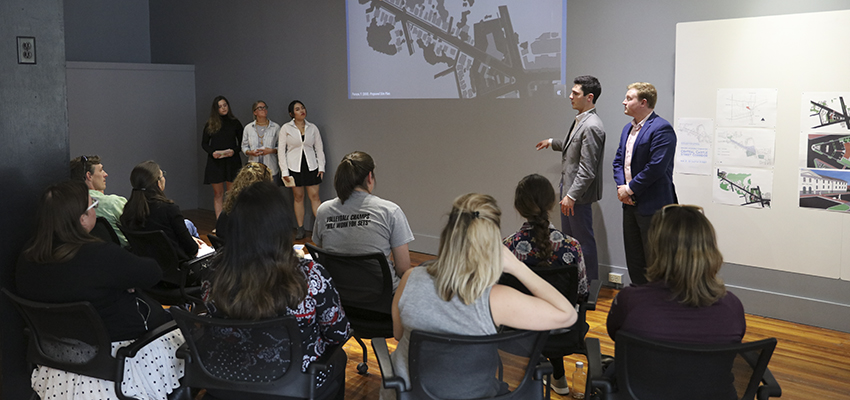
HWS News
20 September 2018 • Arts • Sustainability Sustainable Community Development Rethinks Castle Street
With proposals for a quarter-mile stretch along the Castle Street Corridor in Geneva, students in the spring 2018 Sustainable Community Development (SCD) capstone course have created a series of inclusive, celebratory and innovative designs informed by and tailored to the daily lives of the city’s residents. The interdisciplinary course, taught by Associate Professor of Art and Architecture Jeffrey Blankenship and Assistant Professor of Environmental Studies and Chair of Sustainable Community Development Robin Lewis, integrates curricular and experiential components of architectural studies, environmental studies and urban planning and design in order to familiarize students with the concept of sustainable community development as applied to real world communities.
For their community-based research project, students divided into three groups who each generated a series of evidence-based proposals for a different section of the Castle Street Corridor that includes Byrne Dairy, the Geneva Public Library, and the former Madia’s lot as well as the residential properties located on Castle Street between the five-points intersection of Castle, Main and Milton Streets and Oak Street. With such a “diverse array of urban conditions,” Blankenship says, the corridor is an ideal “testing ground for new strategies designed to strengthen stable neighborhoods.”

“Our research was guided by a desire to design proposals for the Castle Street community that focused on social justice, environmental resiliency and economic viability,” says Noelle Nichols ’18, an environmental studies major and sustainable community development minor. “I envision this research and project leading the way for more inclusive, sustainable and community-centered development within Geneva and potentially even within surrounding towns.”
The class’ proposals were developed in line with the City of Geneva’s Comprehensive Plan and completed in partnership with Interim City Manager and Director of the Geneva Neighborhood Resource Center Sage Gerling, who has helped lead the city’s renewal efforts over the past decade. This July, Gerling was named City Manager of the City of Geneva.
“The Sustainable Community Development coursework on the Castle Street corridor, a plan initiative, will accelerate the City’s efforts in collaborating with residents and property owners to make this corridor thrive,” says Gerling, who oversaw the creation of a Comprehensive Plan for the City of Geneva, which identified key characteristics of the city and its goals as Beautiful, Equitable, Prosperous, Connected and Sustainable. “The students put their hearts and souls into providing the community with thoughtful and creative designs that celebrate the social fabric and physical assets of the corridor.”
As students analyzed the assets of and challenges in the Castle Street Corridor, they sought feedback from residents and community leaders and these recommendations ultimately shaped their designs to increase gathering spaces and spur revitalization, improve pedestrian safety and accessibility to downtown, galvanize community pride and boost both environmental awareness and civic engagement.

“Our intentions were to help those we saw on a daily basis, and their health, happiness and well-being were the marks we evaluated our work upon. Our research was not distant and abstract, but was instead intimate and personally felt each and every day,” says Ryan Montbleau ’19, an environmental studies major and sustainable community development minor who intends to work in advocacy and development in the future.
In short, Blankenship says, “building accessible communities” and “creating an inclusive vision for the central Castle Street corridor” can hopefully serve as a model for the city as it continues its neighborhood initiatives.
At the Bozzuto Center for Entrepreneurship in May 2018, students presented their proposals to an audience of city officials, community members and HWS faculty, students and staff. At the close of the presentation, students fielded questions from the audience and elaborated on the origins of and inspirations for their design proposals.
For more information about the Sustainable Community Development Program at HWS, contact Assistant Professor of Environmental Studies and Chair of Sustainable Community Development Robin Lewis at lewis@hws.edu.
